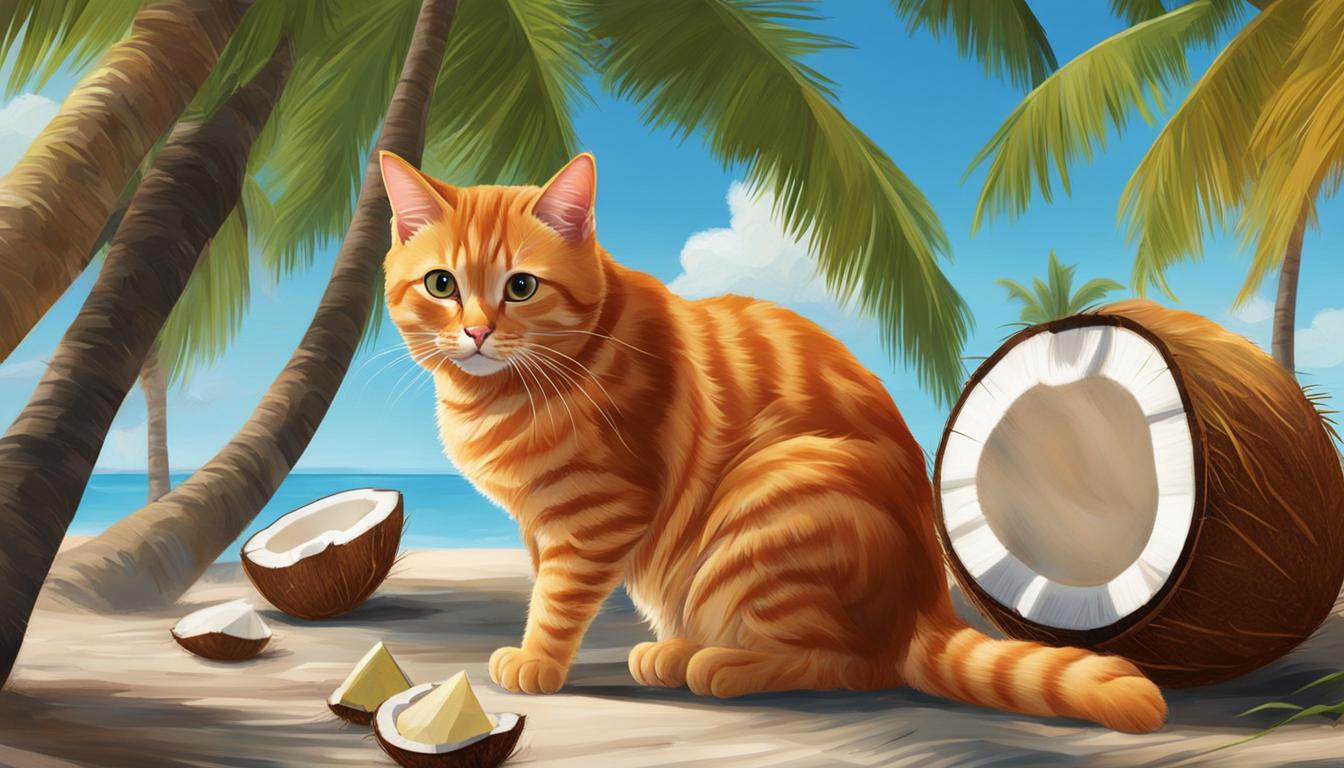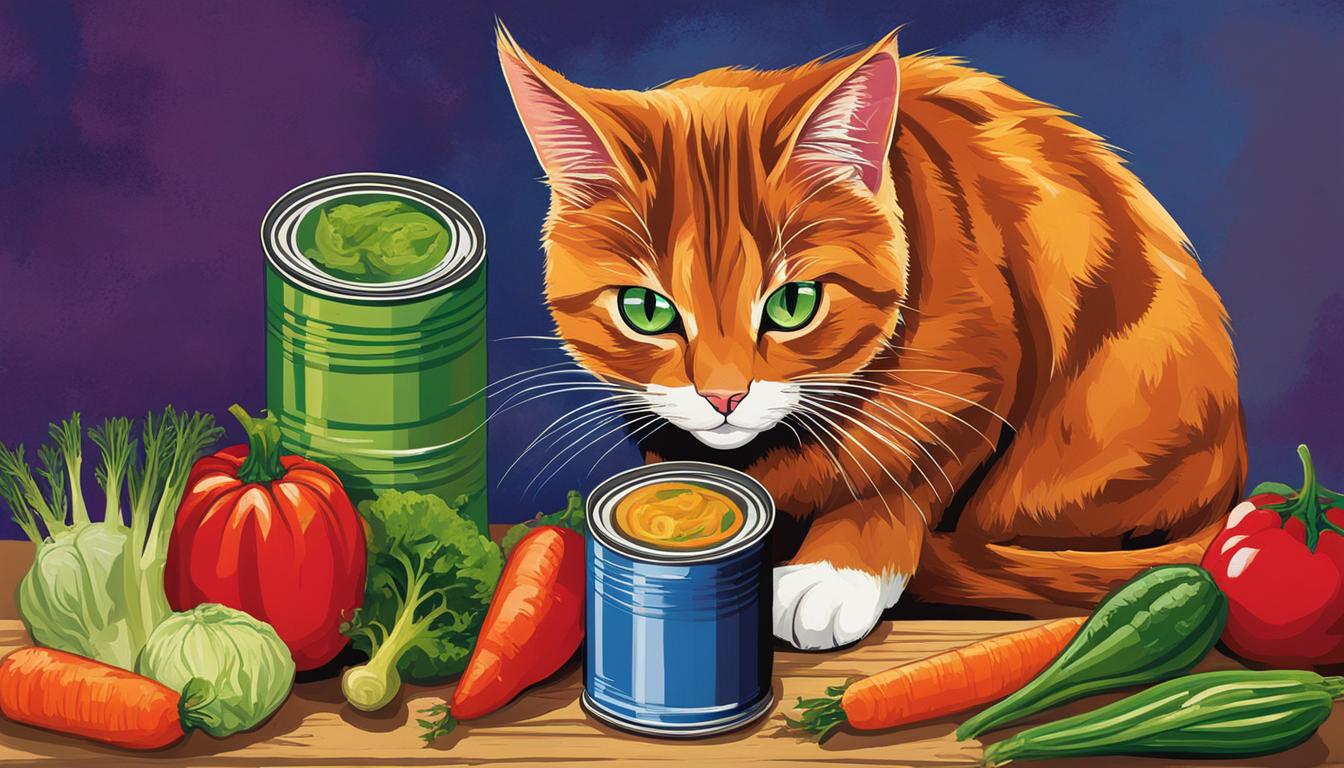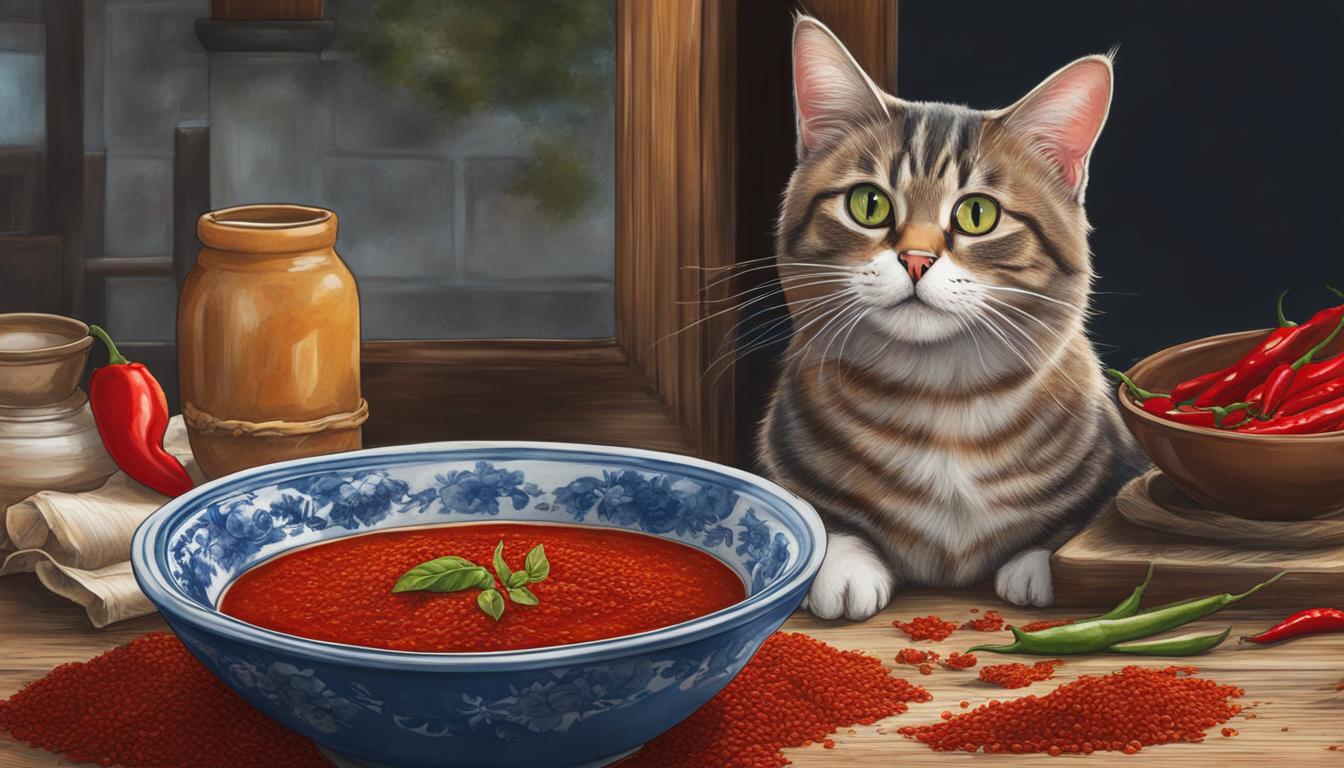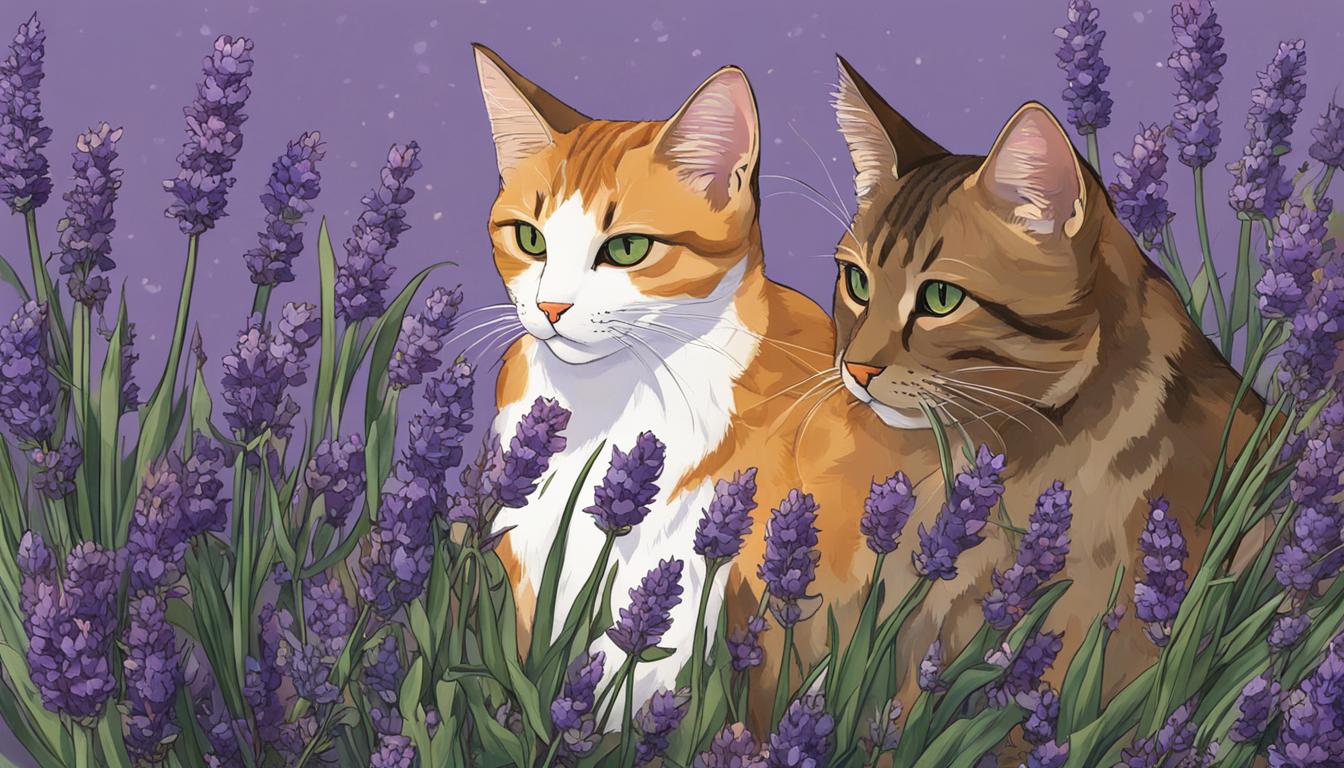When it comes to feline curiosity, their taste buds often get the best of them. As a proud cat owner, I’m always on the lookout for new treats to indulge my furry friend’s culinary adventures. Coconut, with its tropical allure and enticing aroma, seems like a tempting choice. But before you go cracking open a coconut for your feline companion, let’s dive into the question: Can cats eat coconut?
While my cat’s curiosity piques at the sight of coconut, I’ve done my research to ensure her safety. Here’s what I discovered:
Key Takeaways:
- Coconut, in small amounts, is generally safe for cats to eat.
- Consult with a vet before incorporating coconut into your cat’s diet.
- Coconut should be given sparingly due to its high fat content.
- Some cats may have allergies or sensitivities to coconut.
- Cats primarily need protein from animal sources for optimal nutrition.
Is Coconut Safe for Cats?
When it comes to including coconut in your cat’s diet, you may wonder if it is safe for them to consume. While coconut flesh is generally safe for cats, there are some important considerations to keep in mind.
Firstly, it is essential to introduce coconut to your cat’s diet gradually and in small amounts. This is because some cats may have allergies or sensitivities to coconut. By starting with a small quantity, you can monitor your cat for any adverse reactions such as vomiting, diarrhea, or skin irritations. If you notice any of these symptoms, it’s best to discontinue feeding coconut to your cat.
Additionally, if your cat has any underlying health conditions, such as pancreatitis, it is crucial to consult with your veterinarian before incorporating coconut into their diet. Your vet will be able to provide guidance on whether coconut is safe for your cat’s specific health needs.
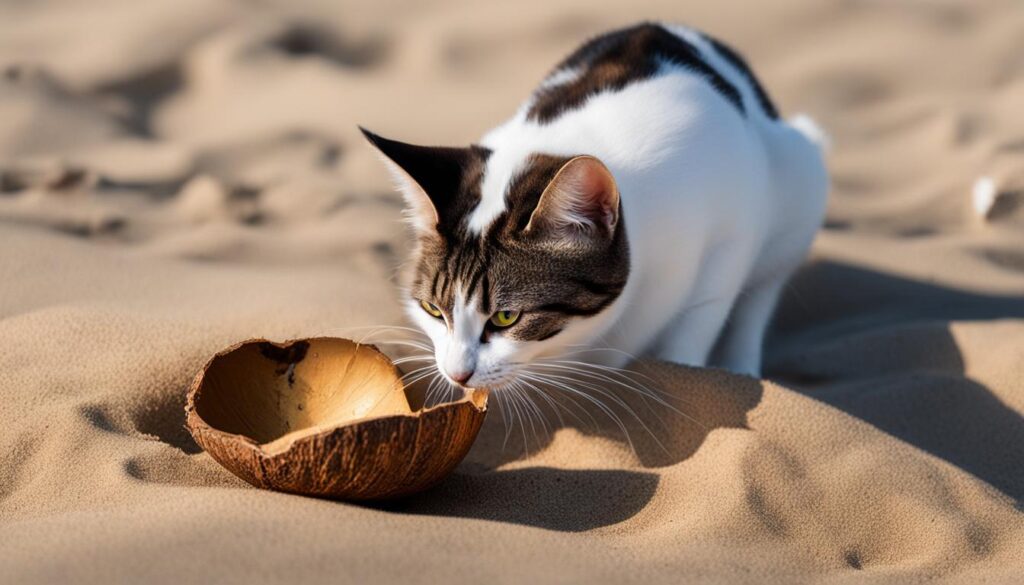
Table: Coconut Safety Guidelines for Cats
| Coconut Safety Guidelines | Description |
|---|---|
| Introduce gradually | Start with small amounts to monitor for any adverse reactions. |
| Monitor for allergies | Watch for symptoms like vomiting, diarrhea, or skin irritations. |
| Consult with vet | If your cat has underlying health conditions, seek advice from your veterinarian. |
While coconut can be included in your cat’s diet, it should only be given sparingly and as a treat rather than a regular part of their meals. Remember to prioritize their nutritional needs as obligate carnivores, ensuring they receive the necessary animal-based protein for optimal health.
Is Coconut Good for Cats?
When it comes to incorporating coconut into your cat’s diet, it’s important to consider its nutritional value and potential health implications. While coconut does contain some nutrients like protein, iron, and manganese, it is not an essential part of a cat’s diet. Cats are obligate carnivores, which means they primarily need protein from animal sources to meet their nutritional needs.
Feeding large amounts of coconut to cats can lead to health issues such as obesity, hyperlipidemia, and pancreatitis. Coconut is high in fat, and excessive fat intake can cause weight gain and related health problems in cats. Therefore, it is best to focus on providing cats with a balanced diet that consists of high-quality animal-based foods.
Table: Nutritional Comparison of Coconut and Chicken
| Nutrients | Coconut (per 100g) | Chicken Breast (per 100g) |
|---|---|---|
| Protein | 2.3g | 31g |
| Fat | 33g | 3.6g |
| Calcium | 14mg | 5mg |
| Iron | 2.4mg | 0.7mg |
As seen in the table, chicken provides significantly higher levels of protein and lower levels of fat compared to coconut. These nutritional differences highlight the importance of prioritizing animal-based protein sources in a cat’s diet.
While coconut can be given to cats in small amounts as an occasional treat, it should not be a significant component of their regular diet. It’s always best to consult with your veterinarian before introducing any new food into your cat’s diet to ensure it is safe and suitable for your furry friend.
Feeding Your Cat Coconut
If you decide to incorporate coconut into your cat’s diet, it’s important to do so in a mindful and responsible manner. While coconut flesh can be given to cats in small amounts as a treat, it’s best to avoid other forms of coconut, such as coconut milk and coconut water, due to their high fat and potassium content. Additionally, coconut oil can be added in small quantities to your cat’s food or homemade treats, but it’s crucial to be aware of its high fat content.
When offering your cat coconut meat, it’s recommended to use freshly shredded coconut. You can sprinkle a small amount onto your cat’s regular food or create coconut treats by mixing shredded coconut with other cat-friendly ingredients. Remember to keep the portions small and give coconut as an occasional indulgence rather than a regular part of your cat’s diet.
It’s important to monitor your cat’s response to coconut and watch for any signs of discomfort or digestive issues. If you notice any adverse reactions, such as vomiting or diarrhea, it’s best to stop feeding coconut immediately and consult with your veterinarian.
“Coconut can be a flavorful and enjoyable treat for cats if given in moderation. However, it’s essential to be mindful of the high fat content and introduce it gradually. Like any new addition to your cat’s diet, it’s always a good idea to consult with your vet to ensure it aligns with their specific health needs.” – Dr. Sarah Stevens, DVM
Table: Comparison of Coconut Products for Cats
| Coconut Product | Suitability for Cats | Recommended Portion |
|---|---|---|
| Freshly Shredded Coconut | Suitable as a treat, in moderation | 1 teaspoon per serving |
| Coconut Milk | Avoid due to high fat content | N/A |
| Coconut Water | Avoid due to high potassium content | N/A |
| Coconut Oil | Suitable in small quantities, mixed with food or treats | 1/4 teaspoon per serving |
By being cautious and informed about feeding coconut to your cat, you can provide them with a tasty and safe treat. Always prioritize your cat’s overall health and consult with a veterinarian for personalized advice.
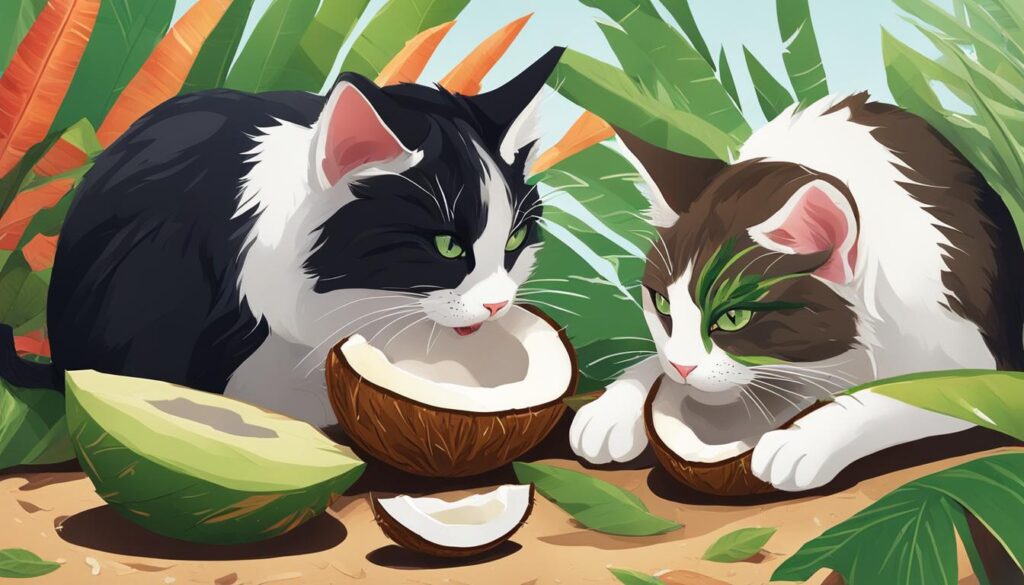
The Potential Risks of Coconut for Cats
While coconut can be a tasty treat for cats, it’s important to be aware of the potential risks associated with feeding them this tropical fruit. One of the main concerns is the high fat content in coconut, which can lead to weight gain and obesity in cats. Obesity is a serious health issue that can increase the risk of various diseases, including diabetes, arthritis, and heart problems.
Additionally, coconut oil, which is often touted for its health benefits, should be used sparingly in cat diets. Although some claims suggest that coconut oil can improve a cat’s coat and digestion, there is limited scientific evidence to support these claims. It’s crucial to remember that coconut oil is still a source of fat and can contribute to weight gain if given in excess.
“Cats are obligate carnivores, which means their bodies are designed to derive nutrition from animal-based protein sources,” says Dr. Amanda Williams, a veterinarian specializing in feline nutrition. “While coconut can be a tasty treat for cats, it should not be a significant part of their diet.”
Moreover, some cats may have allergies or sensitivities to coconut. It’s important to introduce coconut gradually and monitor your cat for any signs of adverse reactions, such as vomiting, diarrhea, or skin irritations. If you notice any unusual symptoms, it’s best to discontinue feeding coconut and consult with your veterinarian.
| Common Risks of Coconut for Cats | Symptoms |
|---|---|
| Weight gain and obesity | Increased body weight, difficulty in movement, lethargy |
| Allergic reactions | Vomiting, diarrhea, skin irritations |
Overall, while coconut can be an occasional treat for cats, it’s important to prioritize their nutritional needs and consult with a veterinarian before incorporating coconut into their diet. Remember to keep coconut consumption moderate and be mindful of any potential risks or sensitivities your cat may have.
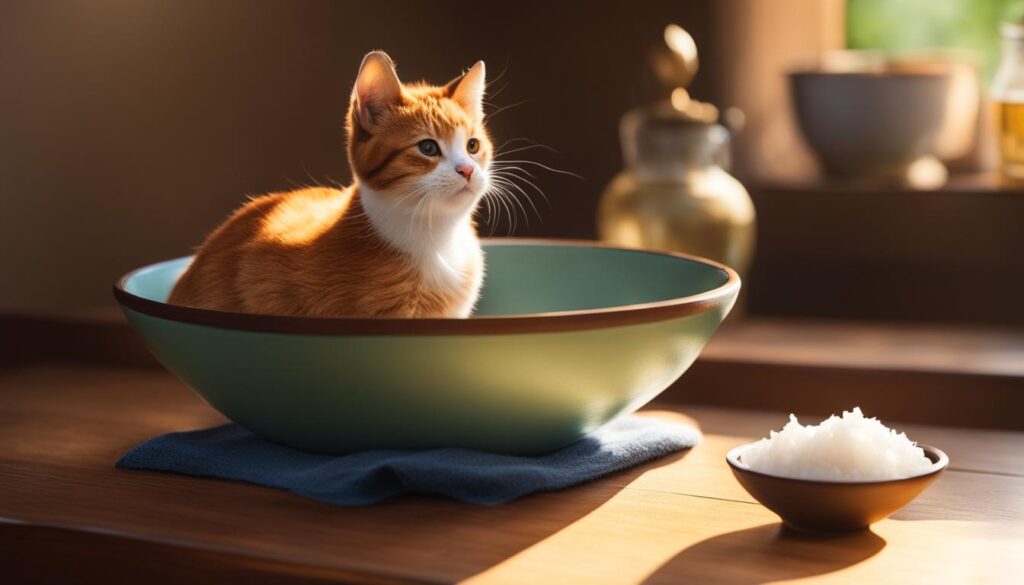
Cat-Friendly Alternatives to Coconut
While coconut may not be the ideal addition to your cat’s diet, there are plenty of cat-friendly alternatives that can provide the necessary nutrients for their health and well-being. Instead of relying on coconut, consider incorporating these alternatives to ensure your feline friend receives a balanced and nutritious diet.
High-Quality Animal-Based Foods
Cats are obligate carnivores, which means they require animal protein as the primary source of nutrition. High-quality animal-based foods, such as chicken, turkey, and fish, can provide the necessary protein and other essential nutrients that cats need for optimal health.
Complete and Balanced Commercial Cat Food
Commercial cat food that is labeled as “complete and balanced” is formulated to meet all of your cat’s nutritional needs. These cat foods are specifically designed to provide the right balance of proteins, fats, and carbohydrates to support your cat’s overall health. Look for brands that have undergone rigorous testing and are recommended by veterinarians.
h3>Homemade Cat Food Recipes
If you prefer to prepare your cat’s meals at home, you can find a variety of homemade cat food recipes that are both safe and nutritious. When creating homemade cat food, it’s important to ensure that it contains all the necessary nutrients and is properly balanced. Consult with a veterinarian or a feline nutritionist to ensure that the homemade meals you prepare meet your cat’s specific dietary requirements.
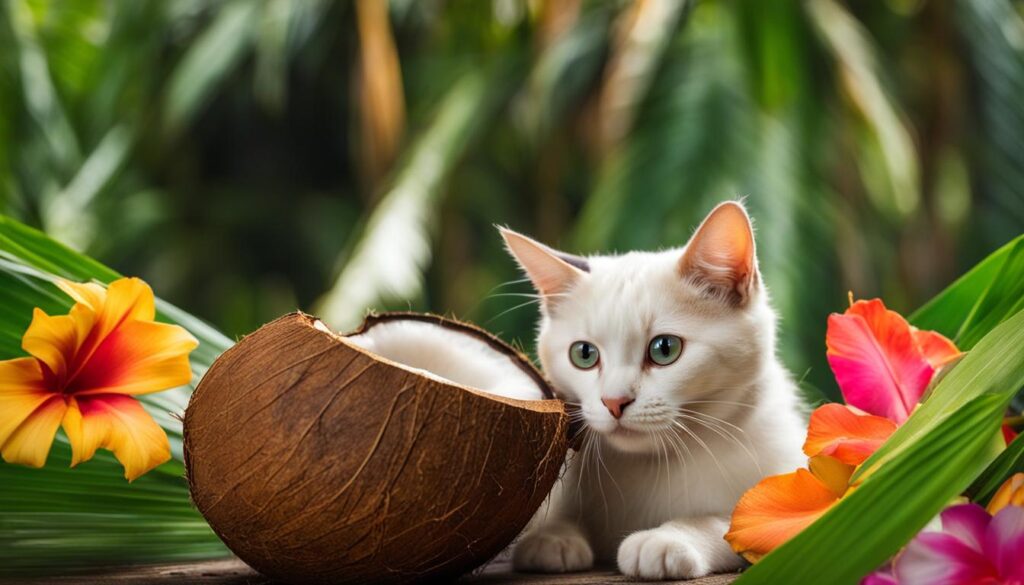
Incorporating Variety
Just like humans, cats can benefit from a varied diet. By incorporating a variety of animal-based proteins, fruits, and vegetables into your cat’s diet, you can provide a range of essential nutrients. However, it’s important to introduce new foods gradually and monitor your cat for any adverse reactions.
By focusing on these cat-friendly alternatives, you can ensure that your feline companion receives the necessary nutrients without the potential risks associated with coconut consumption.
Expert Insights on Cats and Coconut
Veterinary expert Lizzie Youens emphasizes that coconut should be given to cats sparingly and in moderation. As an obligate carnivore, cats have specific dietary requirements that are best met through animal-based foods. Lizzie advises consulting with a vet before introducing coconut into your cat’s diet to ensure it is safe and appropriate for their individual needs.
According to Lizzie, while coconut may contain some nutrients, it is not an essential part of a cat’s diet. Cats primarily need protein from animal sources, and feeding large amounts of coconut can lead to health issues such as obesity, hyperlipidemia, and pancreatitis. Therefore, it’s important to focus on providing cats with a balanced diet that meets their nutritional needs.
When incorporating coconut into your cat’s diet, it’s crucial to monitor for any adverse reactions. Some cats may have allergies or sensitivities to coconut, so it’s best to introduce it gradually. If your cat has any underlying health conditions, it is always recommended to consult with a vet before feeding them coconut or any new food.
“Coconut should not be a significant part of a cat’s diet, as it is not nutritionally essential for them,” advises Lizzie. “While coconut may have some benefits, such as improved coat and digestion, these claims are not supported by strong scientific evidence.”
In conclusion, while small amounts of coconut can be safe for cats, it is important to approach this dietary addition with caution. Always consult with a vet to determine the suitability of coconut for your cat’s individual needs and monitor for any adverse reactions. Remember, a balanced and nutritionally complete diet that focuses on high-quality animal-based foods is essential for your cat’s overall health and well-being.
Expert Insights:
| Expert | Insights |
|---|---|
| Lizzie Youens | “Coconut should be given to cats sparingly and in moderation. While it may contain some nutrients, it is not an essential part of a cat’s diet. Focus on providing a balanced diet that meets their nutritional needs.” |
Conclusion
After exploring the topic of coconut in cat diets, it is clear that while coconut can be consumed by cats in small amounts, it should not play a significant role in their nutrition. Cats are obligate carnivores and require animal-based foods as their primary source of nutrients. Coconut, with its high fat content, should be given sparingly and in moderation to avoid potential health issues.
It is important to consult with a veterinarian before introducing coconut into your cat’s diet, especially if your cat has any underlying health conditions or allergies. Monitoring your cat for any adverse reactions is crucial, as some cats may be sensitive or allergic to coconut.
Instead of relying on coconut as a dietary addition, it is best to focus on providing your cat with high-quality animal-based foods that meet their specific nutritional needs. Consult with your vet to determine the best diet for your cat and to ensure their overall health and well-being.
FAQ
Can cats eat coconut?
Yes, cats can eat coconut in small amounts, but it should be given sparingly due to its high fat content.
Is coconut safe for cats?
Coconut flesh is generally safe for cats, but some cats may have allergies or sensitivities to it. It’s best to introduce coconut gradually and monitor for any adverse reactions.
Is coconut good for cats?
Coconut is not an essential part of a cat’s diet. While it contains some nutrients, cats primarily need protein from animal sources. Feeding large amounts of coconut to cats can lead to health issues.
How should I feed coconut to my cat?
Freshly shredded coconut can be offered to cats in small amounts as a treat. Other forms of coconut, such as coconut milk and coconut water, should generally be avoided.
Are there any risks associated with feeding cats coconut?
Feeding large amounts of coconut to cats can lead to weight gain, obesity, and related health issues. Coconut oil should also be used sparingly due to its high fat content.
What are some cat-friendly alternatives to coconut?
Cats primarily need animal-based foods for their nutritional needs. High-quality animal-based foods, such as chicken, are better options for cats.
What do experts say about cats and coconut?
Veterinary experts advise giving coconut to cats sparingly and consulting with a vet before introducing it into their diet.
Is coconut essential for my cat’s health?
Coconut is not nutritionally essential for cats. It’s important to focus on providing a balanced diet that meets their specific nutritional needs.

